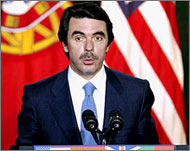Chirac against changes to EU draft
French President Jacques Chirac has urged his fellow EU leaders not to open a “Pandora’s box” by seeking substantial changes to a draft EU constitution.

Leaders of the 15 European Union countries and 10 acceding states were meeting in Rome on Saturday to launch efforts to finalise the text of the bloc’s first constitutional treaty.
“To contest this or that element of the compromise would inevitably open a Pandora’s box and could lead to the failure of the intergovernmental conference,” he said.
At the start of the intergovernmental talks, he reiterated that “France wants to conclude (the negotiations) by the end of the year, and diverge as little as possible” from the draft text.
The bloc’s Italian presidency also hopes a treaty to govern an enlarged EU, which from May will include 25 countries and 450 million people, can be finalised by the end of the year.
Differences remain on a wide number of points.
Voting issue
One of the stickiest is the problem of voting rights. Under the draft, decisions on most policy areas except defence, foreign policy and taxation will be adopted if backed by at least half the member states representing at least 60 percent of the EU’s population.
This would replace the current system of weighted voting, under which each member state has an allocation of votes imperfectly reflecting the size of its population.
Spain and Poland are leading the fight to preserve the existing system. The Nice treaty, negotiated in 2000, gave each of them, with a population of about 40 million, 27 votes, compared with 29 for each of the EU’s Big Four of Germany, Britain, France and Italy, with far larger populations.
 |
|
Spanish PM Jose Maria Aznar does not want to lose his voting advantage |
After the first session of Saturday’s summit, Spanish Prime Minister Jose Maria Aznar said he remains opposed to proposed changes to voting rights.
Along with incoming EU member Poland, Spain is holding out to keep the voting rights it secured under the 2000 Nice Treaty, which give both countries 27 votes against 29 for Germany, which is twice the size.
“There is no consensus on this issue. We are going to maintain this position,” Aznar told reporters.
His Polish allies may have lost their will to fight, as Warsaw now accepts that the present voting system in the European Union may be changed before 2009, the date at which the new constitution would come into effect.
The daily Rzeczpospolita paper quotes Foreign Minister Wlodzimierz Cimoszewicz as acknowledging that the terms of the Nice Treaty “are not eternal” and if they proved unsuitable negotiations could begin on modifying them between now and 2009.
Inclusion of God
Another key issue confronting ministers is that of religion. The constitution’s preamble refers to the EU’s cultural and spiritual heritage but does not mention God or Christianity, the dominant religion on the continent.
 |
|
British FM Jack Straw sees religion as a thorny issue |
Under strong Vatican pressure some Roman Catholic countries, especially Poland, Spain and Italy, are pressing for a more explicit mention of Europe’s religious roots. This is contentious in strictly secular states such as France and could also become an issue given largely Muslim Turkey’s desire to start EU accession talks.
Britain’s foreign minister, Jack Straw acknowledged on Saturday that calls for the inclusion of God in the constitution could yet produce problems.
“It could be an issue which helps Europe come together. It could be a divisive one. It depends on the text. We shall have to wait and see,” he told reporters.
Defence
Another area of fierce debate is that of defence. The draft contains a general solidarity clause providing for mutual assistance in case of a terrorist attack. It would also allow those states that wished to do so to subscribe to a collective defence clause.
Some countries, notably Britain, see this as encroaching on NATO’s role. Others, such as Scandinavian members and Ireland, see the proposal as militarising the EU.
Ministers did find some common ground on Saturday, agreeing at a separate meeting to aim for a takeover of NATO’s Bosnia peacekeeping mission by mid-2004, a timeframe the United States had earlier rejected as too hasty.
“We are looking at some time during 2004 and more likely the second half of 2004,” French Defence Minister Michele Alliot-Marie said after a two-day meeting with her EU counterparts at a barracks of the Carabinieri paramilitary police on the outskirts of Rome.
Officials said Britain had offered to take command of the operation that would succeed NATO’s Stabilisation Force (SFOR) with some 6,000 troops. It was still not clear whether the mission would be given purely military or partly policing tasks.